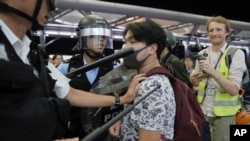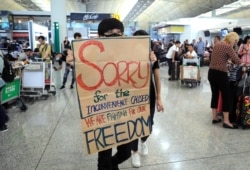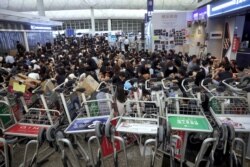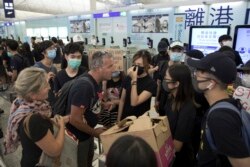Beijing appears to be losing patience with pro-democracy protesters in Hong Kong, ramping up its rhetoric this week by saying that demonstrations have shown "signs of terrorism."
Such language, however, will not help solve the former British colony's political crisis, but only fuel young protesters' anger, analysts say.
They add that Chinese President Xi Jinping, who is fully aware of the heavy cost of a military crackdown, will likely resort to the same strategies used during the city's 2014 Occupy Central pro-democracy movement by patiently waiting it out.
"I don't think calling the young people terrorists solves the problem when they themselves think of themselves as freedom fighters. I think it will anger the young people," said David Zweig, director of the Center on China's Transnational Relations at the Hong Kong University of Science and Technology.
"The only thing that it might do is [to] cause some people to think that there may be a crackdown and so maybe some people will decide not to go out tomorrow," he added.
Canceled flights
The city's mass unrest has lingered for 10 weeks and shows few signs of abating.
On Tuesday, thousands of anti-government protesters swarmed the city's international airport for a second consecutive day, causing the cancellation of all departing flights.
The action suggested that protesters remained undeterred by efforts by police and the harsh stance expressed by officials in Beijing.
Hong Kong police were accused of firing multiple tear gas canisters at metro stations, permanently blinding a female protester's right eye by shooting her at close range and allowing thugs with ties to organized crime to attack demonstrators.
On Monday, Yang Guang, a spokesman for the Hong Kong and Macau Affairs Office (HKMAO) under China's State Council, told Hong Kong media in Beijing that the city had come to a "critical moment," pledging to clamp down on what he called violent crime with an "iron fist."
He said, "Hong Kong's radical protesters have repeatedly attacked police with highly dangerous tools, which constitute serious violent crimes and have started to show signs of terrorism."
A harsher stance
That was the third press conference Chinese officials have held in the past three weeks in response to the escalation of violent clashes between demonstrators and police.
Professor Zweig noted that Beijing is likely waiting for the pro-democracy movement to lose steam when students return to school in September or citizens and business people in Hong Kong grow tired of the turmoil.
Taking Cathay Pacific Airways as an example, Beijing will also continue to pressure the city's Chinese-owned companies into forbidding their employees from joining the protests, he added.
China watcher Lin Chong-pin argued that the deterioration of the city's economy may also trigger resentment toward protesters, which disrupt local business.
"Beijing's best bet is for [the] Hong Kong government and some elements in the Hong Kong society to come out and contain the situation. How effective that will be remains to be seen," Lin said.
Hong Kong Chief Executive Carrie Lam on Tuesday told a press conference that Hong Kong had "reached [a] dangerous situation" and that violence during protests would push it "down a path of no return."
She urged anti-government protesters not to push the city into what she called an "abyss."
Restarting political reforms?
Some of the elite in the city's business community, however, urged China to consider restarting political reforms and allow electoral democracy as a remedy.
"A solution would allow Hong Kong people to rule Hong Kong, through a system of one man, one vote, and direct elections for the position of chief executive," hedge fund manager Cheah Cheng Hye wrote last week in an op-ed in the South China Morning Post.
But Zweig said that, at times like this, Beijing is unlikely to make such concessions and grant the city's 7 million citizens universal suffrage rights.
Beijing is also unlikely to launch a military crackdown similar to what happened during the 1989 student protests in Tiananmen Square as a means of ending Hong Kong's unrest, both Zweig and Lin said.
Any use of force to address Hong Kong's plight will only make Xi vulnerable in the eyes of his political enemies, mainly those who were close to his predecessors Jiang Zemin and Hu Jintao, but caught in the crossfire of Xi's anti-corruption campaign, Lin said.
"I think the hidden picture is that the situation in Hong Kong is also a reflection of the internal power struggle [in Beijing]. And that is what Xi Jinping is afraid [of] the most," the expert added.







